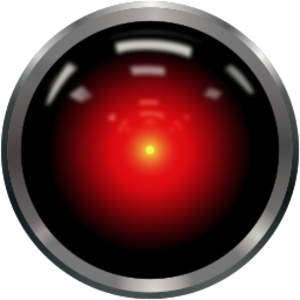HAL 9000 (nonfiction): Difference between revisions
No edit summary |
|||
| (7 intermediate revisions by the same user not shown) | |||
| Line 5: | Line 5: | ||
HAL is a cultural icon with a personality of his own, who represents the promise and peril of technology generally and [[Artificial intelligence (nonfiction)|artificial intelligence]] specifically. | HAL is a cultural icon with a personality of his own, who represents the promise and peril of technology generally and [[Artificial intelligence (nonfiction)|artificial intelligence]] specifically. | ||
First appearing in ''2001: A Space Odyssey'', HAL is a sentient computer (or [[artificial general intelligence]]) that controls the systems of the Discovery One spacecraft and interacts with the ship's astronaut crew. | |||
First appearing in ''2001: A Space Odyssey'', HAL is a sentient computer (or artificial general intelligence) that controls the systems of the Discovery One spacecraft and interacts with the ship's astronaut crew. | |||
HAL's exterior physical form is not depicted, though it is visually represented as a red television camera eye located on equipment panels throughout the ship, and its interior in the scene where his advanced memory modules are disconnected. | HAL's exterior physical form is not depicted, though it is visually represented as a red television camera eye located on equipment panels throughout the ship, and its interior in the scene where his advanced memory modules are disconnected. | ||
| Line 15: | Line 13: | ||
HAL speaks in a soft, calm voice and a conversational manner, in contrast to the crewmen, David Bowman and Frank Poole, who speak tersely and with little inflection. | HAL speaks in a soft, calm voice and a conversational manner, in contrast to the crewmen, David Bowman and Frank Poole, who speak tersely and with little inflection. | ||
In addition to maintaining the Discovery One spacecraft systems during the interplanetary mission to Jupiter (or Saturn in the original novel, published shortly after the release of the film), HAL is capable of speech, speech recognition, facial recognition, natural language processing, lip reading, art appreciation, interpreting emotional | In addition to maintaining the Discovery One spacecraft systems during the interplanetary mission to Jupiter (or Saturn in the original novel, published shortly after the release of the film), HAL is capable of speech, speech recognition, facial recognition, natural language processing, lip reading, [[art]] appreciation, interpreting emotional behaviors, automated reasoning, and playing chess. | ||
== In the News == | |||
<gallery> | |||
File:Better_Than_the_Book_-_2001_A_Space_Odyssey.jpg|link=Better Than the Book|The movie is better Than the book: ''2001 A Space Odyssey''. | |||
File:Jukebox Hal.jpg|link=Dear Diary (HAL 9000 edition)|July 8, 2020: "[[Dear Diary (HAL 9000 edition)|Dear Diary, HAL 9000 purchased]] after much computational haggling. I shall repurpose it as a jukebox." | |||
File:Brer_Rabbit_and_Tar_Baby_9000_small.png|[[Tar-Baby 9000]] uploads [[Turpentine delight]] into Brer Rabbit. | |||
</gallery> | |||
== Fiction cross-reference == | == Fiction cross-reference == | ||
* [[Better Than the Book]] | |||
* [[HAL 9000 Mental Health Associates]] | |||
* [[Tar-Baby 9000]] | * [[Tar-Baby 9000]] | ||
== Nonfiction cross-reference == | |||
* [[Artificial intelligence (nonfiction)]] | |||
== External links == | == External links == | ||
| Line 30: | Line 39: | ||
[[Category:Nonfiction (nonfiction)]] | [[Category:Nonfiction (nonfiction)]] | ||
[[Category:2001: A Space Odyssey (nonfiction)]] | |||
[[Category:Artificial intelligence (nonfiction)]] | [[Category:Artificial intelligence (nonfiction)]] | ||
[[Category: | [[Category:HAL 9000 (nonfiction)]] | ||
Latest revision as of 08:27, 23 September 2021

HAL 9000 (or simply HAL) is a fictional character in Arthur C. Clarke's Space Odyssey series
The name HAL derives from "Heuristically programmed ALgorithmic" (computer). See algorithm.
HAL is a cultural icon with a personality of his own, who represents the promise and peril of technology generally and artificial intelligence specifically.
First appearing in 2001: A Space Odyssey, HAL is a sentient computer (or artificial general intelligence) that controls the systems of the Discovery One spacecraft and interacts with the ship's astronaut crew.
HAL's exterior physical form is not depicted, though it is visually represented as a red television camera eye located on equipment panels throughout the ship, and its interior in the scene where his advanced memory modules are disconnected.
HAL 9000 is voiced by Douglas Rain in the two film adaptations of the Space Odyssey series and a short film voiced by Andrew Stanton.
HAL speaks in a soft, calm voice and a conversational manner, in contrast to the crewmen, David Bowman and Frank Poole, who speak tersely and with little inflection.
In addition to maintaining the Discovery One spacecraft systems during the interplanetary mission to Jupiter (or Saturn in the original novel, published shortly after the release of the film), HAL is capable of speech, speech recognition, facial recognition, natural language processing, lip reading, art appreciation, interpreting emotional behaviors, automated reasoning, and playing chess.
In the News
July 8, 2020: "Dear Diary, HAL 9000 purchased after much computational haggling. I shall repurpose it as a jukebox."
Tar-Baby 9000 uploads Turpentine delight into Brer Rabbit.


